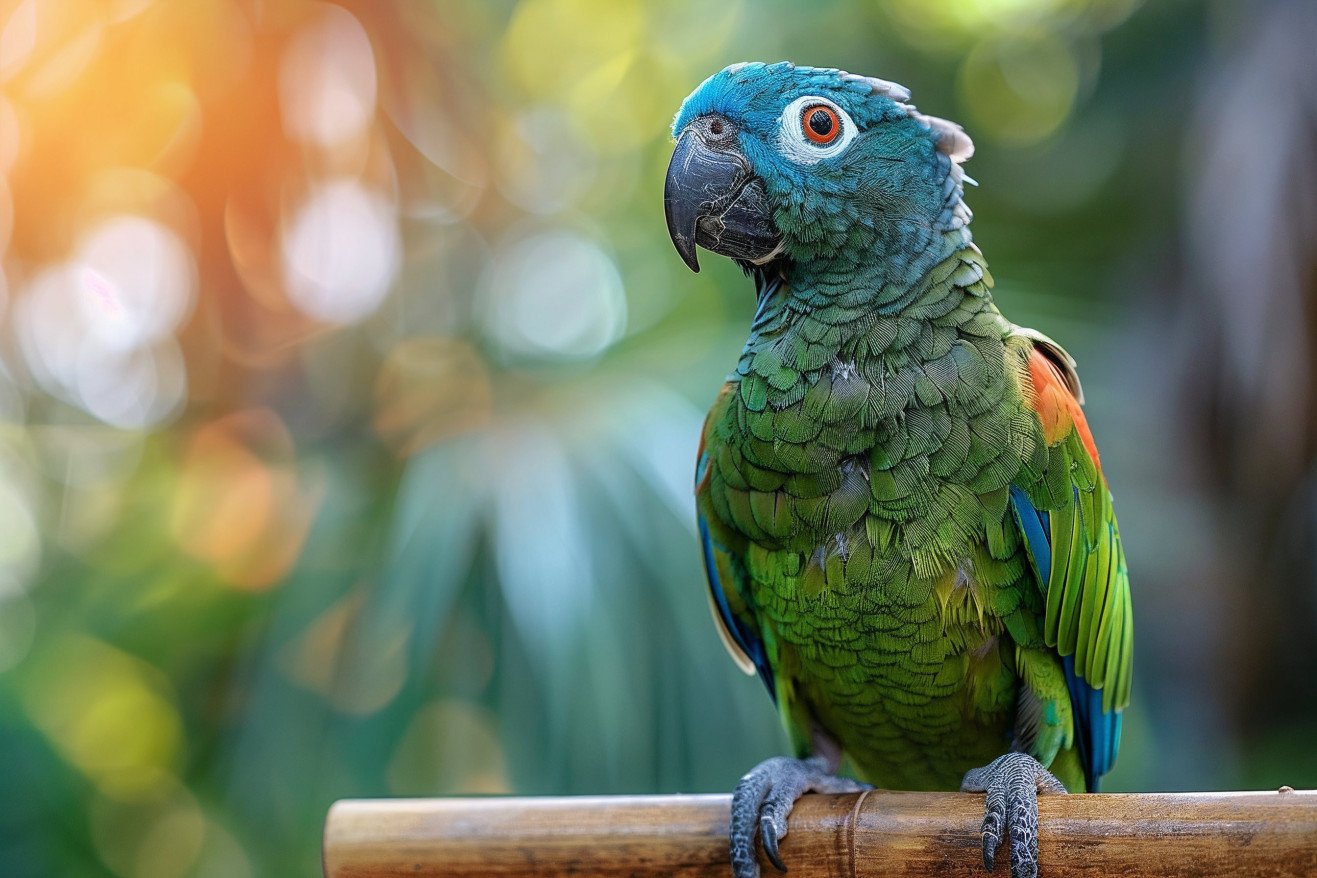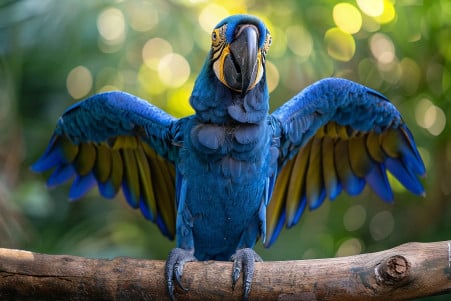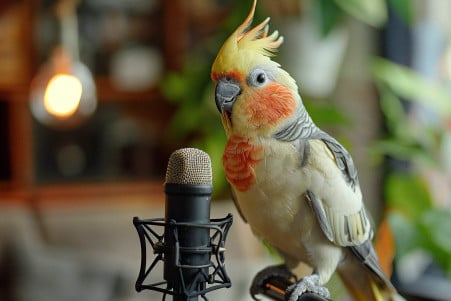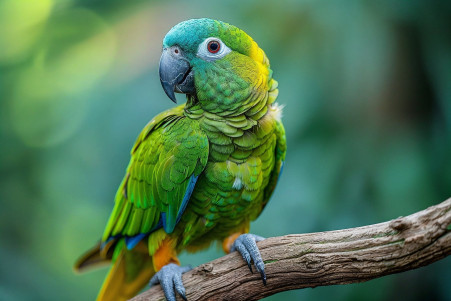Can Conures Talk? Exploring the Speaking Abilities of These Colorful Companions
12 May 2024 • Updated 11 May 2024

If you’ve ever wondered whether the colorful, lively conure can talk and even pick up on human language like their parrot relatives, you’re not alone. Conures are beloved for their fun, friendly nature and, in fact, can learn to talk to some extent, even if their skills in this area don’t quite measure up to those of larger parrots. However, with the right training and a little patience, many conure owners have successfully taught their pets to speak a few words and phrases.
From an overview of conure vocalizations and speech imitation research in a variety of conure species, to a look at the training methods and cognitive processes that enable these birds to talk, this article will explore the studies that have investigated the talking abilities of these popular pet birds. Not only will this be of interest to parrot lovers, but it will also offer valuable information on avian cognition and the special relationships between conures and their human families.
Can conures talk?
Differences Between Conure Species and Their Ability to Talk
The larger the conure species, the better their talking ability and the larger their vocabulary, with blue-crowned, cherry-headed, and mitred conures being the most likely to talk. As one Parrot Forum commenter observed, "The larger species tend to be clearer - Cherry heads, Mitred, Blue Crown."
On the other hand, smaller conure species, such as green-cheeked and dusky conures, are the least likely to talk. That said, BeChewy noted that some of these birds can surprise their owners with their talking ability, citing "a quieter and less showy green-cheeked female conure that won the prize for the individual bird with the largest vocabulary."
Male conures are more likely to talk than females, which is likely due to hormonal and behavioral differences between the sexes. A study published in PLOS ONE reported that "imitated male test birds showed a significantly higher call rate compared to non-imitated males, while imitated and non-imitated females did not differ."
Even within the same species, individual conures can differ greatly in their ability to talk, which is influenced by factors such as intelligence and exposure to human speech. That said, while there are trends, each conure is an individual, so owners should temper their expectations based on their bird's species, sex, and natural ability. After all, as the research shows, a conure's ability to talk is influenced by many factors, and some may be excellent talkers even if their species isn't known for its talking ability.
Training Methods to Teach Conures to Talk
Before you start training your conure to talk, it's important to develop a strong relationship and earn the bird's trust so that it feels safe enough to mimic you. The Spruce Pets explains that "The first step to teaching your bird to talk is to bond with your feathered friend and form reasonable expectations of it."
After you've established trust, you can start training your conure to talk by using positive reinforcement, such as treats and verbal praise, to reward the bird when it successfully repeats a word or sound during short training sessions that are held multiple times a day. The Absolute Exotic notes that you should "Reward your conure with praise, treats, or gentle physical affection whenever they make progress or attempt to mimic the words you're teaching."
Speak clearly and slowly when you say the words or phrases that you want your conure to learn, and remember to be patient because it can take several weeks or even months before your bird starts to talk. The Absolute Exotic explains that you should "Speak clearly and enunciate the words you want them to learn. Maintain a slow and steady pace, giving your bird ample time to process and mimic the sounds."
In addition to in-person training sessions, you can use training aids, such as audio recordings, to help your conure learn to talk. However, it's important to remember that, as The Spruce Pets points out, "Using these tools can be effective, and certainly won't hinder the training process, but owners should know that they are no substitute for one-on-one interaction, and should be used only as supplemental training aids."
Finally, it's important to manage your expectations when it comes to your conure's ability to talk, both in terms of its species and its individual personality. Some conures may never learn to talk, no matter how much you try to train them. As the Parrot Forum explains, "Firstly conures do not have great talking ability. A sun conure could probably pick up a vocabulary of 5-10 words. Of course it could be more or less, it depends on the bird."
Beyond Words: The Many Sounds of Conures
In addition to talking, conures are known for making a wide variety of natural sounds, including chirps, whistles, screeches, and other noises. According to the Avian Avenue Parrot Forum, these sounds can be used for everything from greetings and excitement to distress, hunger, and warning calls.
Conures may also try to mimic sounds other than human speech, including laughter, sneezes, and even entire conversations that don't include words. As explained in Today's Wonder of the Day, "Repeating sounds you've heard many times before is called mimicry. The 'talking' we hear from parrots is mimicry of all sorts of sounds. They imitate many things, from spoken words to creaking doors to barking dogs."
While these sounds are a way for conures to communicate with their fellow flock members and human companions, they also have a more basic function. According to BeChewy, "when your conure speaks, you know you're listening to a bird" - their sounds are a constant reminder of their avian nature and are part of what makes them such delightful pets. Learning to recognize the many sounds a conure makes can help owners understand their pet's needs and build a stronger relationship with them.
How to Help a Conure Develop Its Talking Ability: Environment and Training
A stimulating environment that includes a variety of toys and other forms of enrichment is important for stimulating a conure's natural curiosity and desire to talk, according to Avian Enrichment. A healthy diet and regular exercise and out-of-cage time are important for overall health, which can help a conure's talking skills, according to the Small Conure Care Sheet on PetMD.
Regular socialization and interaction with humans, including being involved in household activities, can encourage conures to talk more, according to Lafeber Co.. Reducing stress from factors like noise and using positive reinforcement training can help prevent negative behaviors that may interfere with a conure's ability to talk, according to PetHelpful. Regular veterinary care can help ensure any health problems that could affect a conure's talking are caught and treated early.
With the right environment, care, and training, conure owners can help their birds develop their natural talking ability while strengthening their relationship with their pet.
The Talking Conure: Benefits, Challenges, and Things to Know
Owning a conure that talks can be a very rewarding experience and can help to further strengthen the special bond between bird and owner. As mentioned by BirdSupplies.com, "Positive reinforcement training is key to improving problem behaviors" in talkative conures. However, it's important for owners to be aware of the potential downsides of a talkative bird, including excessive noise, the bird learning to say inappropriate words or sounds, and the bird becoming demanding.
The Spruce Pets explains that "Screaming is another undesirable behavior that many bird owners report as a nuisance" and that "destructive behavior in parrots is often a sign that a bird either has a problem with his or her environment or isn't receiving enough mental stimulation to keep its mind occupied." Proper training and mental stimulation are important for preventing problem vocalizations and for helping to manage a talkative conure.
Conures are a long-term commitment, as they are intelligent creatures that can live for more than 20 years if properly cared for, according to Parrot Hub. People who are thinking about getting a talkative conure should make sure that they can dedicate the time, energy, and money to meeting all of the needs of a talkative conure before bringing one home.
Conclusion: Understanding Conure Talking Abilities
Although conures may not be the best talkers when compared to larger parrot species, their ability to mimic human speech and create a variety of sounds is still quite amazing. A conure's talking ability is influenced by a number of factors, including species, sex, environment, training methods, and the bird's individual personality.
However, many conure owners can successfully train and socialize their pets from a young age to create a fun and talkative avian friend. In addition to talking, conures use their vocalizations to bond and communicate with their human companions in ways that are both special and rewarding. For those who can meet their needs, conures can make wonderful pets, whether they become accomplished talkers or not.


